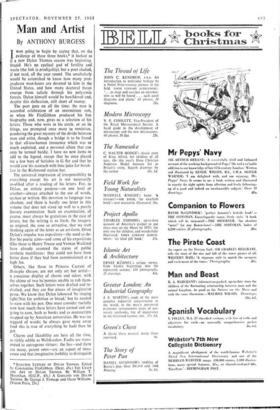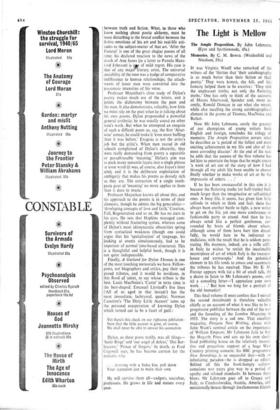Man and Artist
By ANTHONY BURGESS
WAS going to begin by saying that, on the I evidence of these three books,* it looked as if a new Dylan Thomas season was beginning.
Stupid. He's no cyclical god of fertility and waste (the link is prodigality), but a poet studied, if not read, all the year round. The unscholarly
would be astonished to know how many post- graduate man-hours are devoted to him in the
United States, and how many doctoral theses emerge from safaris through his polysemic forests. Dylan himself would be bewildered and, despite this deification, still short of money.
The poet goes on all the time; the man is accorded celebration of an intermittent sort, as when Mr FitzGibbon produced his fine biography and, now, gives us a selection of his letters. Those who were in his circle, or on its fringe, are prompted once more to reminisce, pondering the great mystery of the divide between man and artist, though a bridge is to be found in that all-too-human innocence which was so much exploited, and a personal allure that can only be termed bardic. 1 have no new items to add to the legend, except that he once played me a few bars of Scriabin in G flat and that he would cow his stomach with lime juice for break- fast in the Richmond station bar.
The universal impression of irresponsibility to everything except his art is not necessarily modified after a reading of his letters. For, to Dylan, an artistic purpose—on one level or another—always attached to the use of words, spoken or written. His devotion to language was absolute, and there is hardly one letter in this volume that does not stand up well to a purely literary examination. Such an examination, of course, must always be gratuitous in the case of letters, but the writing is so fresh, the imagery so original, the tone so attractive, that we start thinking again of the letter as an art-form. Often Dylan's impulse was expository—the need to de- fine his poetic aims—and some of his expositions (like those to Henry Treece and Vernon Watkins) have already assumed the status of public aesthetic manifestos: they could not have been better done if they had been commissioned at a high fee.
Others, like those to Princess Caetani of Botteghe °scum are not only art but artful— a conscious display of charm and talent, with the chime of two ha'pennies unable to rub them- selves together. Such letters were drafted and re- drafted, and they are fine pieces of imaginative prose. We know that Dylan laboured 'by singing light/Not for ambition or bread,' but he needed to earn with his pen. One must consider ruefully now how much these letters have earned and are going to earn, both as books and as manuscripts snapped up by American universities. He was no niggard of words; he always gave more away (and this is true of everything he had) than he got.
Charm and likeability are here all the time, as richly edible as Welsh-cakes. Faults are trans- muted to outrageous virtues: the lies—and there are many, patent ones—are an aspect of inno- cence and that imaginative inability to distinguish
* SELECTED LETTERS OF DYLAN THOMAS. Edited by Constantine FitzGibbon. (Dent, 45s.) THE CRAFT AND ART OF DYLAN THOMAS. By William T. Moynihan. (O.U.P., 45s.) A GARLAND FOR DYLAN THOMAS. By George J. Firmage and Oscar Williams. (Vision Press, 25s.) between truth and fiction. What, to those who know nothing about poetic alchemy, must be most disturbing is the brutal conflict between the fictive .emotions of his art and his real-life atti- tudes to the subject-matter of that art. 'After the Funeral' is one of the great elegiac poems of all time; his declared reaction to the news of the death of Ann Jones (in a letter to Pamela Hans- ford Johnson) is w of mild regret. His case is that of any major iterary artist. The universal amiability of the man was a badge of comparative indifference to human relationships; the attach- ments of lesser men were converted into the passionate intensities of his verse.
Professor Moynihan's close study of Dylan's poetry makes much use of the letters, and it points the dichotomy between the poet and the man. It also demonstrates, valuably, how little we must rely on the poet when he is talking about his own poems. Dylan propounded a powerful general aesthetic; he was usually sound on other men's work. But when he attempted an exegesis of such a difficult poem as, say, the first 'Altar- wise' sonnet, he could make it 'even more baffling than it was before.' Exegesis is not the artist's job but the critic's. When men reared in old schools complained of Dylan's obscurity, they were really demanding from poetry a separable or paraphrasable 'meaning.' Dylan's aim was to pack many semantic layers into a single phrase or even word (it was, of course, also Joyce's later aim), and it is the deliberate exploitation of ambiguity that makes his poems as densely rich as they are. The extraction of a single tooth- paste gout of 'meaning' no more applies to them than it does to music.
Professor Moynihan knows all about this, and his approach to the poems is in terms of their elements, though he admits the big generalities— `developing concepts of love and faith,' Creation, Fall, Regeneration and so on. He has no stars in his eyes. He sees that Hopkins managed com- plexity without fracturing syntax, whereas some of Dylan's most idiosyncratic obscurities spring from syntactical weakness (though one could argue that his `spatialisation' of language, his looking at events simultaneously, had to be impatient of normal time-based structures). This is a thoughtful and helpful book, though it is not quite indispensable.
Finally, A Garland for Dylan Thomas is one of the most touching memorials we have. Fellow- poets, not biographers and critics, pay their sad proud tributes, and it would be invidious, in this flood of talent, to say whose tribute is the best. Louis MacNeice's 'Canto' in terza rima is the best-shaped; Emanuel Litvinoff's five lines (`All of us aged in that instant') has the most immediate, lachrymal, quality; Norman Cameron's 'The Dirty Little Accuser' sums up the personal exasperation of knowing Dylan which turned out to be a facet of guilt : Yet there's this check on our righteous jubilation: Now that the little accuser is gone, of course, We shall never be able to answer his accusation.
Dylan, as these poets testify, was all things— `Saint Binge' and 'our angel of defeat,' Dai Bar- leycorn,' Prinee of Singers.' In death, as Fred Cogswell says, he has become carrion for the pedants, who . . . damning with a Judas kiss, pull down Your reputation just to make their own.
He will. survive them all—cadgers, succubae, professors. He grows in life and stature every year.















































 Previous page
Previous page